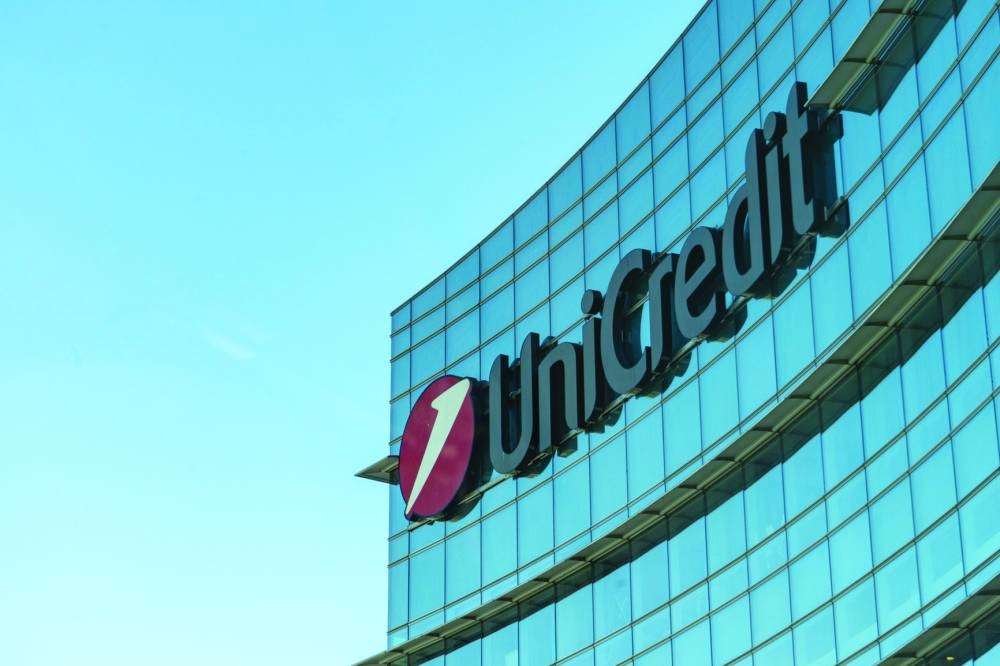UniCredit SpA is facing the prospect of higher capital requirements next year, with its main regulator seeking to ensure the bank’s resilience against risks from Russia’s war in Ukraine and the economic downturn, according to people familiar with the matter.
The European Central Bank (ECB) has indicated to UniCredit that it’s considering raising the firm’s so-called Pillar 2 requirement, which currently stands at 1.75%, said the people, who asked to remain anonymous as the move hasn’t been announced. The measure is usually increased or lowered in increments of 0.25%, meaning the next step for the Italian lender would probably be 2% of its risk-weighted assets.
Through the Pillar 2 mechanism, the ECB has the power to force individual banks to conserve more capital when it considers them to be out of step with the central bank’s assessment of the likelihood of future losses. An increase for UniCredit may also serve as a warning to others, as chief executive officer Andrea Orcel is currently offering one of the region’s most generous dividend and buyback policies.
As UniCredit’s total capital position is well in excess of legal and individual requirements, a raise may only slightly dent Orcel’s ability to return funds to investors. UniCredit pledged late last year to distribute at least €16bn ($16.9bn) via dividends and share buybacks between 2021 and 2024.
UniCredit shares reversed earlier gains after the report, declining as much as 1.7%. A spokesman for UniCredit declined to comment as did a spokesman for the ECB. Banks can meet the ECB’s requirements with a mix of high quality capital known as common equity Tier 1 as well as types of subordinated bonds.
The requirement comes on top of other buffers banks are obliged to hold. In total, UniCredit had to maintain a CET1 ratio of just over 9% in 2022. The ratio stood at 15.4% at the end of September, meaning the Italian lender had about €20bn of equity above that threshold.
Russia’s invasion of Ukraine has cast a shadow over Europe’s economy and the banks that keep it running. While UniCredit has largely written off its business in Russia itself, it still has €3bn of cross-border exposure to the country and its operations in Italy, Germany and Austria mean the firm is vulnerable to a downturn in some of the markets most reliant on disrupted supplies of natural gas.
Many euro-area lenders are currently benefiting from a boost in interest revenue given the ECB’s path of rate increases, but a recession that’s likely already begun amid double-digit inflation is worsening the outlook into 2023.
The central bank’s annual risk review should be finalized as soon as next week, said the people. No formal communication on the capital requirement decision has been relayed to UniCredit, one of the people said. Banks have a chance to weigh in on the ECB’s evaluation before it is made final.
UniCredit isn’t alone in bracing for higher requirements. Raiffeisen Bank International AG, the Austrian lender that has a major unit in Russia, said last month that it expects its Pillar 2 to rise, based on a draft letter from the ECB. The ECB has also imposed capital charges related to leveraged finance on BNP Paribas SA and Deutsche Bank AG, arguing that they have ignored warnings to cut risk, Bloomberg reported last month. UniCredit said last month that it is “well positioned” for a period of macroeconomic uncertainty and had made extra provisions against potential losses of about €1.3bn.

The headquarters of UniCredit in Milan. UniCredit is facing the prospect of higher capital requirements next year, with its main regulator seeking to ensure the bank’s resilience against risks from Russia’s war in Ukraine and the economic downturn.
